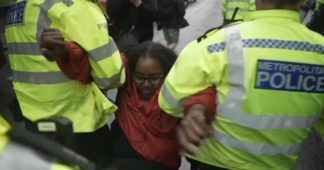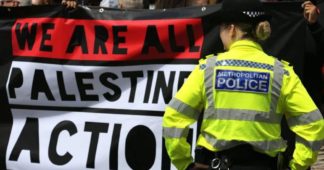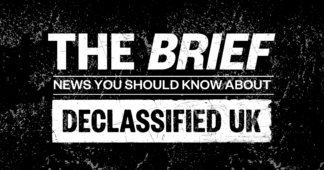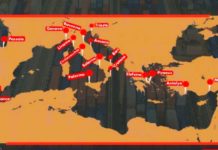Declassified UK
Jul 31, 2025
At the High Court in London yesterday, Palestine Action co-founder Huda Ammori was granted permission to appeal the group’s proscription as a terrorist organisation.
The direct-action network was banned earlier this month after UK home secretary Yvette Cooper said its activities “met the threshold set out in the statutory tests established under the Terrorism Act 2000”.
In a statement to parliament, Cooper argued Palestine Action had “orchestrated a nationwide campaign of direct criminal action against businesses and institutions”.
The targets included “key national infrastructure and defence firms that provide services and supplies to support Ukraine, NATO, Five Eyes allies and the UK defence enterprise”.
Cooper further contended that Palestine Action had hit infrastructure relating to “UK national security” and impacted “innocent members of the public fleeing for safety and subjected to violence”.
But official documents submitted to the court by the Home Office appeared to contradict Cooper’s stated concerns about national security and violence against persons.
Declassified revealed last week how the UK government was secretly advised that Palestine Action was “highly unlikely” to advocate for violence while officials struggled to produce evidence that it posed a national security threat.
The proscription order nonetheless passed through parliament on 5 July, with over 200 people subsequently being arrested in Britain for holding signs which allegedly showed support for the group.
Those arrested included an 83-year-old priest, a man holding a Private Eye satirical cartoon, and a disabled person in a wheelchair, provoking widespread concerns about human rights violations in Britain.
Indeed, UN human rights chief Volker Türk said last week that the ban “appears to constitute an impermissible restriction on rights that is at odds with the UK’s obligations under international human rights law”.
Judge Chamberlain appeared to broadly agree with Türk. In yesterday’s ruling, he said proscription “is likely to give rise to a substantial interference with rights guaranteed by the common law and by Articles 10 and 11” of the European Convention on Human Rights.
Those articles cover fundamental rights relating to freedom of expression and freedom of assembly and association. Chamberlain also granted leave for Judicial Review on the grounds that Cooper should have consulted Ammori before laying the proscription order.
Ammori said this was a “landmark decision… especially at a time when protesters – mostly elderly citizens – are being dragged off into police vans, held in detention for more than 24 hours, having their homes raided and face criminal persecution”.
What happens now?
The proscription order will remain in place, meaning it’s still illegal to show or invite support for Palestine Action, with possible penalties of up to 14 years in prison.
A Judicial Review will be heard by the High Court over three days in November. Notably, UN special rapporteur on terrorism Ben Saul, who has previously voiced opposition to the ban on Palestine Action, has already been granted permission to intervene in the case.
We remind our readers that publication of articles on our site does not mean that we agree with what is written. Our policy is to publish anything which we consider of interest, so as to assist our readers in forming their opinions. Sometimes we even publish articles with which we totally disagree, since we believe it is important for our readers to be informed on as wide a spectrum of views as possible.











